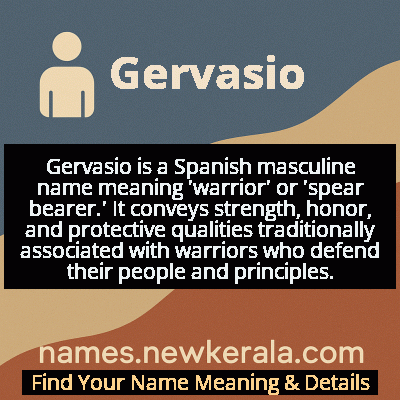Gervasio Name Meaning & Details
Origin, Popularity, Numerology Analysis & Name Meaning of Gervasio
Discover the origin, meaning, and cultural significance of the name GERVASIO. Delve into its historical roots and explore the lasting impact it has had on communities and traditions.
Name
Gervasio
Gender
Male
Origin
Spanish
Lucky Number
6
Meaning of the Name - Gervasio
Gervasio is a Spanish masculine name meaning 'warrior' or 'spear bearer.' It conveys strength, honor, and protective qualities traditionally associated with warriors who defend their people and principles.
Gervasio - Complete Numerology Analysis
Your Numerology Number
Based on Pythagorean Numerology System
Ruling Planet
Venus
Positive Nature
Harmonious, responsible, caring, and artistic.
Negative Traits
Overly idealistic, superficial, possessive, or jealous.
Lucky Colours
Pink, turquoise.
Lucky Days
Friday.
Lucky Stones
Diamond, turquoise.
Harmony Numbers
2, 3, 9.
Best Suited Professions
Artists, musicians, teachers, healthcare workers.
What People Like About You
Warmth, nurturing nature, artistic flair.
Famous People Named Gervasio
Gervasio Antonio de Posadas
Politician
First Supreme Director of the United Provinces of the Río de la Plata
Gervasio Artigas
Military leader
National hero of Uruguay and independence leader
Gervasio Deferr
Gymnast
Two-time Olympic gold medalist for Spain
Gervasio Sánchez
Photojournalist
Internationally recognized war correspondent and humanitarian
Name Variations & International Equivalents
Click on blue names to explore their detailed meanings. Gray names with will be available soon.
Cultural & Historical Significance
The cultural significance of Gervasio extends beyond historical figures to encompass traditional values of masculinity, honor, and family loyalty in Spanish culture. In many regions, the name is associated with rural traditions and the image of the strong, dependable patriarch who protects and provides for his community. This cultural resonance has kept the name in continuous use despite fluctuations in popularity, ensuring its place as a name that conveys respect, tradition, and strength across generations of Spanish-speaking families.
Extended Personality Analysis
Individuals named Gervasio are typically perceived as strong-willed, principled, and determined characters with a natural leadership quality. They often exhibit a warrior spirit—not necessarily in the literal sense of combat, but in their approach to overcoming challenges and defending their beliefs. Gervasios tend to be deeply loyal to their family, friends, and causes they believe in, showing remarkable perseverance when faced with adversity. Their strength is often balanced with a sense of honor and justice, making them reliable and trustworthy individuals who others naturally look to for guidance and support.
Beyond their evident strength and determination, Gervasios often possess a quiet dignity and traditional values that make them stabilizing influences in their social circles. They tend to be practical problem-solvers who approach difficulties with methodical determination rather than impulsive reactions. While they can be somewhat reserved in expressing emotions, their actions consistently demonstrate their care and commitment to those they value. This combination of inner fortitude, reliability, and principled behavior often leads Gervasios to assume positions of responsibility where their natural authority and sense of duty can benefit their communities or organizations.
Modern Usage & Popularity
In contemporary times, Gervasio remains a traditional Spanish name that is relatively uncommon but respected. It maintains a steady, though not widespread, usage primarily in Spain, Uruguay, Argentina, and other Spanish-speaking countries where historical connections to figures like Artigas give it cultural significance. The name has seen a slight resurgence in recent years as parents seek traditional names with strong historical roots and masculine connotations. While it doesn't rank among the most popular names in Spanish-speaking countries, it continues to be chosen by families who value its historical weight, distinctive sound, and association with strength and leadership. Its usage is more common among older generations but is experiencing some revival as vintage names come back into fashion, particularly among families with military traditions or those seeking to honor ancestral connections.
Symbolic & Spiritual Meanings
Symbolically, Gervasio represents the archetype of the honorable warrior—someone who fights not for aggression but for protection, justice, and noble ideals. The name embodies the concept of strength tempered by principle, suggesting a person who wields power responsibly. It symbolizes resilience in adversity, the courage to stand for one's convictions, and the willingness to lead when called upon. Metaphorically, Gervasio represents the spear—not as a weapon of offense, but as a tool of defense and a symbol of authority. The name carries connotations of steadfastness, like an ancient oak that withstands storms, and loyalty that remains unshaken through challenges. It suggests a bridge between traditional values and progressive action, making it symbolic of evolutionary rather than revolutionary change, where strength serves protection and leadership serves community.

